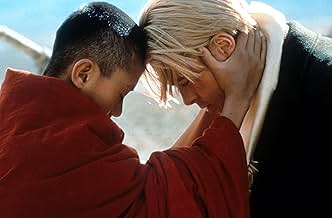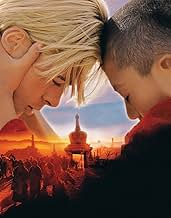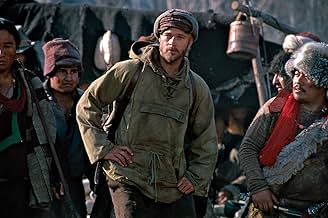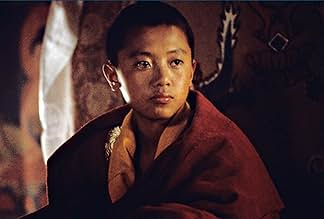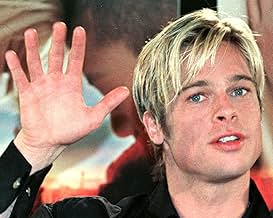IMDb RATING
7.1/10
161K
YOUR RATING
Heinrich Harrer, an Austrian climber, breaks out of prison and travels to the holy city of Lhasa. He is employed as an instructor to the 14th Dalai Lama and soon becomes his close confidante... Read allHeinrich Harrer, an Austrian climber, breaks out of prison and travels to the holy city of Lhasa. He is employed as an instructor to the 14th Dalai Lama and soon becomes his close confidante.Heinrich Harrer, an Austrian climber, breaks out of prison and travels to the holy city of Lhasa. He is employed as an instructor to the 14th Dalai Lama and soon becomes his close confidante.
- Awards
- 3 wins & 8 nominations total
BD Wong
- Ngawang Jigme
- (as B.D. Wong)
Ngawang Chojor
- Lord Chamberlain
- (as Ven. Ngawang Chojor)
- Director
- Writers
- All cast & crew
- Production, box office & more at IMDbPro
Featured review
A movie is by definition a fictional tale. It may be based - more or less loosely - on real events, but it is still a fiction.
This part seems to have escaped many "reviewers" as it always does when a movie is based on "real events". In real life there are long periods when nothing exciting or interesting happens, but a movie cannot follow a character 24/7 in his daily life, even if that life takes place in Tibet.
This story is very loosely based on the experience of Austrian climber Heinrich Harrer, who embarked on a climbing expedition on the brink on WWII and ended up as POW in a British camp in India, for most of the war.
Having no reason to go back to Austria, he then ended up in Tibet where he met and became tutor to the 14th Dalai Lama. His adventure ended with the Chinese invasion of Tibet. That's it and it is already quite a lot.
The plot is a journey of discovery, not only geographical but also psychological. Thanks to his experience, Harrer turns from selfish, arrogant and uncaring into a gentler human being.
According to those who read Harrer account of his story, the film takes a lot of liberties, inventing episodes that - for me - are just supposed to make the story more cohesive. Also, I did not care much about Harrer involvement with the Nazi party, for which he apologised and that clearly was not the core of his existence.
Finally, for those who protest because the movie does not explore Tibetan culture, once more this is based on Harrer's tale, from is point of view. You want to know Tibetan history and Buddhist culture? There are thousand of non-fictional books and documentaries to fulfil this purpose.
This part seems to have escaped many "reviewers" as it always does when a movie is based on "real events". In real life there are long periods when nothing exciting or interesting happens, but a movie cannot follow a character 24/7 in his daily life, even if that life takes place in Tibet.
This story is very loosely based on the experience of Austrian climber Heinrich Harrer, who embarked on a climbing expedition on the brink on WWII and ended up as POW in a British camp in India, for most of the war.
Having no reason to go back to Austria, he then ended up in Tibet where he met and became tutor to the 14th Dalai Lama. His adventure ended with the Chinese invasion of Tibet. That's it and it is already quite a lot.
The plot is a journey of discovery, not only geographical but also psychological. Thanks to his experience, Harrer turns from selfish, arrogant and uncaring into a gentler human being.
According to those who read Harrer account of his story, the film takes a lot of liberties, inventing episodes that - for me - are just supposed to make the story more cohesive. Also, I did not care much about Harrer involvement with the Nazi party, for which he apologised and that clearly was not the core of his existence.
Finally, for those who protest because the movie does not explore Tibetan culture, once more this is based on Harrer's tale, from is point of view. You want to know Tibetan history and Buddhist culture? There are thousand of non-fictional books and documentaries to fulfil this purpose.
Storyline
Did you know
- TriviaJetsun Pema is the real-life sister of The Dalai Lama. In this film she plays the mother of The Dalai Lama and hence her own mother.
- GoofsThe movie depicts the Dalai Lama's enthronement occurring after Germany surrenders in WWII, and after China invades Tibet. The actual Enthronement Ceremony took place on 22 February 1940, (Iron-Dragon Year, 1st month, 14th day), long before the end of the war and the Chinese invasion. On 17 November 1950 the Dalai Lama assumed full temporal (political) power over Tibet, more then 10 years after his Enthronement Ceremony.
- Quotes
Dalai Lama: We have a saying in Tibet: If a problem can be solved there is no use worrying about it. If it can't be solved, worrying will do no good.
- Crazy creditsAs the end credits roll, a view of the mountains of Tibet is seen.
- SoundtracksPurification Et Benediction
Performed by Monks of Namgyal Monastere
Details
- Release date
- Country of origin
- Official site
- Languages
- Also known as
- Siete Años en el Tíbet
- Filming locations
- Production companies
- See more company credits at IMDbPro
Box office
- Budget
- $70,000,000 (estimated)
- Gross US & Canada
- $37,957,682
- Opening weekend US & Canada
- $10,020,378
- Oct 12, 1997
- Gross worldwide
- $131,457,682
- Runtime2 hours 16 minutes
- Color
- Sound mix
- Aspect ratio
- 2.39 : 1
Contribute to this page
Suggest an edit or add missing content


















